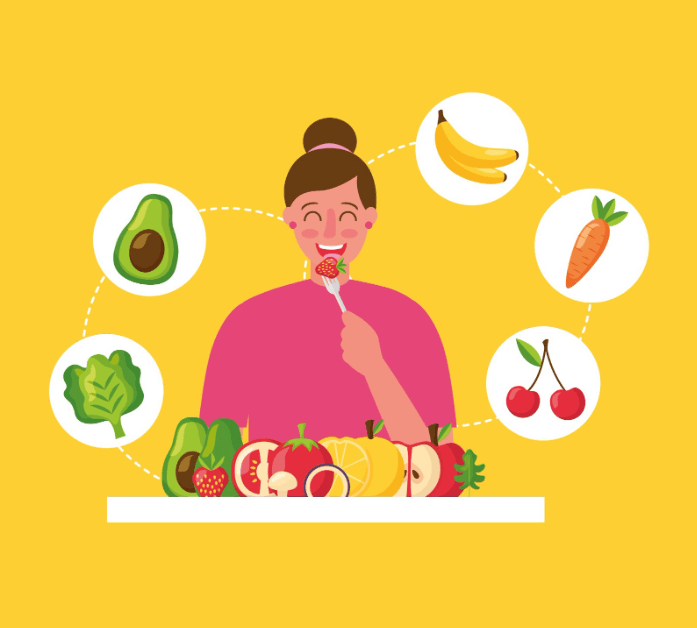Introduction
Our lives are getting busier every day, with work, family, and social commitments taking up most of our time. It can be challenging to find the time and energy to prioritize our health, especially when it comes to eating well.
Despite the importance of good nutrition, many of us struggle to maintain a healthy diet due to our busy schedules. We often find ourselves grabbing a quick snack on the go or ordering some healthy food or snacks, which most of the time are our only options. In this blog, we will share some practical and easy-to-follow healthy eating tips for adults on how to maintain good nutrition even with a busy lifestyle.
Understanding Nutrition and its Importance
Nutrition refers to food intake in relation to the body’s dietary needs. It plays a vital role in our health and development, and is key to strengthening our immune system.
Our body requires a variety of nutrients to function correctly, including carbohydrates, proteins, fats, vitamins, and minerals. Each of these nutrients has a specific role to play in our body.
| Nutrient | Role in Our Body |
| Carbohydrates | Primary source of energy. |
| Proteins | Building blocks of the body. |
| Fats | Concentrated source of energy. |
| Vitamins | Maintain vital functions and metabolic state. |
| Minerals | Maintain vital functions and metabolic state. |
| Water | Regulates body temperature and removes waste. |
| Roughage (Fiber) | Regulates the body’s use of sugars. |
However, it’s not just about consuming these nutrients; it’s also about balance. A healthy diet is one that includes the right balance of different nutrients. According to the Harvard T.H. Chan School of Public Health, a balanced diet should include plenty of fruits, vegetables, whole grains, healthy protein sources like fish and nuts, and limited amounts of red and processed meats, sugary drinks, and highly processed foods.
Unfortunately, with our busy schedules, we often find ourselves eating on the go, which can make it challenging to maintain this balance. We might end up skipping meals, eating too much or too little, or opting for quick, unhealthy options, which is why it is important to plan and make healthy food choices, especially when having a busy schedule.
Challenges of Eating on the go
Eating healthy on the go can be quite a challenge, especially in today’s fast-paced world. With busy schedules, Long working hours and constant multitasking, finding the time to prepare and eat nutritious meals often becomes a daunting task. Some common challenges to eating healthy food when having busy lives include:
- Time constraints: Busy schedule leads to opting for quick and convenient food options which are often unhealthy.
- Availability of unhealthy food: Fast food outlets and convenience stores offer high-calorie and nutrient-poor food options.
- Mindless eating: Eating while busy can lead to overeating and poor food choices due to a lack of awareness.
- Stress: It can cause changes in eating habits, generally leading to a rise in the consumption of high-fat and high-sugar meals.
Quick Healthy Eating Strategies for People on the Move
Now, let’s discuss healthy eating tips for busy professionals.
Strategy 1: Plan Your Meals in Advance
Meal planning is a simple yet effective strategy to maintain a healthy diet, especially for those with a busy lifestyle. It involves planning your meals and snacks in advance to ensure that you have healthy options readily available. This can help you avoid resorting to unhealthy food choices when you’re pressed for time.
Benefits of Meal Planning
- Balanced and nutritious diet: A healthy eating plan ensures a variety of foods and necessary nutrients. A balanced diet should include fruits, vegetables, whole grains, and healthy protein sources.
- Saves time and reduces stress: With healthy meals, there’s no need to constantly worry about what to cook or eat, there’s no daily worry about what to cook or eat. Meals can be prepared in advance or batch-cooked and frozen for later use.
- Controls portion sizes: Planning meals allows for deciding on portion sizes in advance, helping to avoid overeating and maintain a healthy weight.
- Saves money: Meal planning and shopping accordingly can avoid impulse purchases and reduce food waste.
Strategy 2: Start With A Healthy Breakfast
Starting your day with a healthy breakfast is one of the best ways to set yourself up for success. A nutritious breakfast can provide you with the energy you need to get through the day and can also help prevent overeating later on. However, with our busy schedules, we often find ourselves skipping breakfast or opting for unhealthy options.
Some Healthy Breakfast Ideas:
- Whole Grains and Cereals
They are rich in fiber and can help keep you feeling full for longer. You can top your cereal or oatmeal with some fresh fruits and nuts for added nutrition. According to the Harvard T.H. Chan School of Public Health, whole grains can help reduce the risk of heart disease, type 2 diabetes, and certain types of cancer.
- Eggs
They are a good source of protein and can help keep you feeling satisfied throughout the morning. You can have them boiled, scrambled, or even make an omelet with some vegetables for a more filling meal.
- Smoothies
Smoothies can also make for the healthiest food to eat. You can blend some fruits with yogurt or milk and add some nuts or seeds for extra protein. Just be mindful of the portion sizes to avoid consuming too many calories.
- Toast
Lastly, if you’re really pressed for time, even a piece of whole-grain toast with some almond butter or avocado can make for a healthy breakfast. The key is to include a balance of carbohydrates, protein, and healthy fats in your meal.
Strategy 3: Pack a Nutritious Lunch
Lunch is an important meal that can provide you with the energy you need to get through the rest of your day. However, with our busy schedules, we often find ourselves grabbing a quick lunch on the go or eating in restaurants or fast food chains, which may not always be the healthiest option.
Some Tips to Pack a Healthy, Balanced Lunch
- Include a balance of different nutrients in your lunch. A balanced diet should have fruits, vegetables, whole grains, and healthy protein sources.
- Avoid packing too much food to prevent overeating. Aim for a balance of different food groups.
- Prepare your lunch the night before to save time and avoid unhealthy options. Consider batch cooking and freezing meals for the week.
- Include fruits, nuts, and yogurt in your lunchbox for a quick energy boost in the afternoon.
Strategy 4: Carry Snacks for Quick Energy
Snacks play a crucial role in a balanced diet, especially for those with busy schedules. They can provide a quick energy boost between meals and prevent overeating during meal times. However, it’s important to make smart snacking choices to ensure that your snacks are contributing positively to your overall nutrition.
Strategy 5: Stay Hydrated
Hydration is a crucial aspect of nutrition that often gets overlooked. Our bodies are made up of about 60% water, and staying hydrated is essential for maintaining overall health and well-being.
Despite its importance, many of us do not consume enough water daily. This can lead to dehydration, which can have various effects on the body. Mild dehydration can cause symptoms like dry mouth, fatigue, and headaches, while severe dehydration can lead to more serious complications like low blood pressure and a rapid heart rate.
So, how much water should you drink?
While the amount can vary depending on factors like age, sex, weight, and physical activity level, a general rule of thumb is to aim for at least 8 glasses of water a day. However, it’s important to listen to your body and drink when you’re thirsty.
Lastly, remember that other beverages like tea, coffee, and juices, and foods like fruits and vegetables, can also contribute to your daily water intake. However, it’s best to limit beverages with added sugars or caffeine.
Strategy 6: Do Not Stress
Stress is a common part of our lives, especially in today’s fast-paced world. However, it’s important to understand that stress can significantly impact our eating habits.
Firstly, stress can often lead to changes in eating behaviors. According to an article in Nature, stress can lead to increased consumption of high-fat and high-sugar foods. This is because stress triggers the body’s “fight or flight” response, which can increase cravings for foods that provide a quick source of energy.
Secondly, stress can also affect our digestion. When we’re stressed, our body diverts energy away from processes like digestion to deal with the perceived threat. This can lead to digestive problems like bloating, constipation, or diarrhea.
Thirdly, stress can also disrupt our eating patterns. Some people may lose their appetite when they’re stressed, while others may overeat. Both can lead to an unbalanced diet and various health problems.
So, how can we manage stress to maintain a healthy diet?
Firstly, regular physical activity can be a great stress reliever. According to the Harvard T.H. Chan School of Public Health, regular exercise can help reduce stress and improve mood. Secondly, relaxation techniques like deep breathing, meditation, or yoga can also help manage stress. Lastly, getting enough sleep and maintaining a social support network can also help reduce stress levels.
Bottom Line
Remember, maintaining a healthy diet is not just about eating the right foods but also about balance, portion control, and conscious food choices. It’s about planning your meals, staying active, managing stress, and staying hydrated. It’s a lifestyle choice that requires commitment and effort, but the benefits are well worth it.

